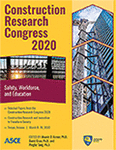Construction Research Congress 2020
Commute and Labour Productivity: Inner City Construction Sites
Publication: Construction Research Congress 2020: Safety, Workforce, and Education
ABSTRACT
This paper seeks to identify the impact that commute patterns pose on construction labour productivity. There is limited research focused on the impact of workforce transportation on productivity, even fewer in a construction environment. In particular, this study seeks to fill a gap in the understanding of how commute patterns may influence construction labour productivity. Key factors reported affecting construction labour productivity were identified through a comprehensive literature review. Data were collected from 27 interviews as well as observational evidence at construction sites on Auckland CBD. Shortage of skills, communication among workers, shirking behaviour, absenteeism, and tardiness were perceived as the most critical labour productivity factors in the surveyed construction sites that are influenced by commute patterns. It is considered that stressful commutes may lead to shirking behaviours (absenteeism, calling sick), meanwhile, ridesharing may encourage communication among workers. The research outcomes can be used as guidelines for companies considering travel plans for their employees, in order to minimise the negative impact commuting can have on workers, especially in industries with low productivity. The study was carried out in an urban context, focusing on a geographic area with its particular characteristics, with a small number of interview participants. The results thus, may not be generalised in rural settings.
Get full access to this article
View all available purchase options and get full access to this chapter.
REFERENCES
Amponsah-Tawiah, K, Annor, F and Arthur, BG. (2016) “Linking commuting stress to job satisfaction and turnover intention: The mediating role of burnout.” Journal of Workplace Behavioral Health 31: 104-123.
Attar, A, Gupta, A and Desai, D. (2012) “A study of various factors affecting labour productivity and methods to improve it.” IOSR Journal of Mechanical and Civil Engineering 1: 11-14.
CORE. (2017) The Economy CORE Economics Education
Dai, J, Goodrum, PM and Maloney, WF. (2007) “Analysis of craft workers' and foremen's perceptions of the factors affecting construction labour productivity.” Construction Management and Economics 25: 1139-1152.
Ditmore, C and Deming, D. (2015) “A Comparative Analysis of Vanpool and Single Occupant Commuters’ Self-reported Stress Level Before and After the Commute”.
Durdyev, S and Mbachu, J. (2011) “On-site labour productivity of New Zealand construction industry: Key constraints and improvement measures.” Construction Economics and Building 11: 18-33.
Gopal, SR and Murali, K. (2016) “Analysis of factors affecting labour productivity in construction.” International Journal of Recent Scientific Research 7: 11744-11747.
Gutiérrez-i-Puigarnau, E and Van Ommeren, JN. (2010) “Labour supply and commuting.” Journal of Urban Economics 68: 82-89.
Koslowsky, M, Kluger, AN and Reich, M. (1995) “Behavioral, Emotional, and Attitudinal Effects of Commuting.” Commuting Stress. Springer, 79-106.
Loong, C, Van Lierop, D and El-Geneidy, A. (2017) “On time and ready to go: An analysis of commuters’ punctuality and energy levels at work or school.” Transportation Research Part F: Traffic Psychology and Behaviour 45: 1-13.
Naoum, SG. (2016) “Factors influencing labor productivity on construction sites : A state-of-the-art literature review and a survey.” International Journal of Productivity and Performance Management 65: 401-421.
Novaco, RW and Gonzalez, OI. (2009) “Commuting and well-being.” Technology and Psychological Well-being. Cambridge: Cambridge University Press, 174-205.
Page, I. (2010) Construction industry productivity: Study Report SR 219. Wellington: BRANZ.
Page, IC and Norman, D. (2014) Measuring construction industry productivity and performance: BRANZ.
PwC. (2016) Valuing the role of construction in the New Zealand economy.
Rissel, C, Petrunoff, N, Wen, LM, et al. (2014) “Travel to work and self-reported stress: Findings from a workplace survey in south west Sydney, Australia.” Journal of Transport & Health 1: 50-53.
Robles, G, Stifi, A, Ponz-Tienda, JL, et al. (2014) “Labor productivity in the construction industry-factors influencing the Spanish construction labor productivity.” International Journal of Civil, Structural, Construction and Architectural Engineering 8: 1009-1018.
Ross, SL and Zenou, Y. (2008) “Are shirking and leisure substitutable? An empirical test of efficiency wages based on urban economic theory.” Regional Science and Urban Economics 38: 498-517.
Schaeffer, MH, Street, SW, Singer, JE, et al. (1988) “Effects of Control on the Stress Reactions of Commuters.” Journal of Applied Social Psychology 18: 944-957.
Soekiman, A, Pribadi, K, Soemardi, B, et al. (2011) “Factors relating to labor productivity affecting the project schedule performance in Indonesia.” Procedia engineering 14: 865-873.
Tookey, JE. (2011) “Labour productivity in the New Zealand construction industry: A thorough investigation.” Construction Economics and Building 11: 41-60.
Van Ommeren, JN and Gutiérrez-i-Puigarnau, E. (2011) “Are workers with a long commute less productive? An empirical analysis of absenteeism.” Regional Science and Urban Economics 41: 1-8.
Wertz, FJ, Charmaz, K, McMullen, L, et al. (2011) Five ways of doing qualitative analysis, New York: Guilford.
Worksafe New Zealand and ACC. (2015) Construction in New Zealand.
Zenou, Y. (2009) Urban Labor Economics: New York, NY : Cambridge University Press, 2009.
Information & Authors
Information
Published In
Construction Research Congress 2020: Safety, Workforce, and Education
Pages: 239 - 249
Editors: Mounir El Asmar, Ph.D., Arizona State University, David Grau, Ph.D., Arizona State University, and Pingbo Tang, Ph.D., Arizona State University
ISBN (Online): 978-0-7844-8287-2
Copyright
© 2020 American Society of Civil Engineers.
History
Published online: Nov 9, 2020
Published in print: Nov 9, 2020
Authors
Metrics & Citations
Metrics
Citations
Download citation
If you have the appropriate software installed, you can download article citation data to the citation manager of your choice. Simply select your manager software from the list below and click Download.
